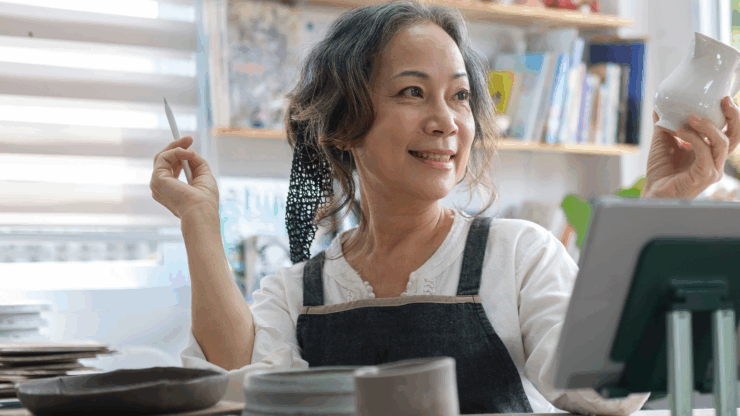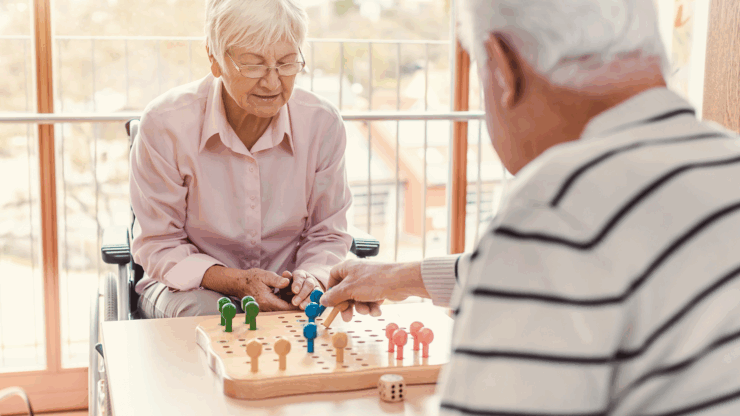
7 Types of Hobbies That Older Adults Can Begin in the New Year
Happy New Year! As 2022 has come to a wrap and 2023 is already underway we are filled with hope to make this year better than the last. During the month of January, many people make New Year’s resolutions as a goal and desire to change. January is also National Hobby Month, a perfect time to start and enjoy the hobbies that bring us joy and a sense of accomplishment.For seniors, it’s essential to plan activities that support physical, mental, and emotional health. Trying new activities and/or rekindling old hobbies that bring joy all year long is a step to a healthier, more enjoyable season, regardless of the time of the year. To help expand a loved one’s horizons and get creative in the process of taking up a hobby, here’s a list of some unique ideas:
- Creative Arts
- Creating art is one of the most popular hobbies for individuals of all ages. For older adults, it’s a fantastic way to spend their leisure time. Painting, knitting, sketching, or drawing – to name a few – are different forms through which a loved one can create art. Their art interest might also lean into sculpting, literature, or writing.
- Cooking
- You can learn new cooking techniques in an infinite variety of ways, from studying old family recipes to watching cooking demonstrations and exchanging recipes/tips with friends and neighbors. Seniors can take full charge of their health through food while they discover new foods and socialize over meals.
- Exercise
- Exercising is beneficial to both our physical and mental health. It’s very easy to find free senior exercise routines that can be done from the comfort of your own home. Some fantastic exercise ideas for people of all fitness levels include:
- Hiking
- Walking
- Cycling
- Going to the gym
- Fitness classes and groups
- Exercising is beneficial to both our physical and mental health. It’s very easy to find free senior exercise routines that can be done from the comfort of your own home. Some fantastic exercise ideas for people of all fitness levels include:
- Playing games
- Getting together with friends to play games is an effective way to improve socialization. Engaging in friendly competition through games like bridge and chess with friends or at a senior center can help keep social anxiety at bay by keeping seniors connected with a common hobby. Having a group of friends to regularly play games with can reduce symptoms of depression and feelings of loneliness.
- Learn a different language
- Learning a different language can bring both joy and a sense of accomplishment and with modern technology, accessing language lessons is easier than ever. Bilingualism has been shown to positively affect the brain’s anatomy and play an important role in cognitive reserve, which may even help to delay the onset of Alzheimer’s.
- Listen to Podcasts
- Podcasts can inspire people, especially seniors to start this new sector of their lives in a positive way. Plus, podcasts can help listeners stay on top of current global events. Podcasts are great for personal growth and can encourage people to create and achieve goals during their retirement years. Listening to podcasts can offer seniors an escape from their routine, engage in lifelong learning, and cater to one’s moods.
- Journaling
- Keeping a log of daily comings and goings is a useful tool to look back on in the future, and it can be an invaluable treasure for future generations to read. One of the many benefits of journaling as a hobby is that it is something you can pick up and do anytime whether you decide to do it daily or simply when the mood hits you.
Ultimately, finding an enjoyable hobby is an important way to stay engaged in life and connected with others. If you’re looking to identify the activity or hobby that best meets your interest and abilities, consider making a comprehensive list of past and “bucket list” hobbies. Older adults can engage in several types of hobbies during their free time, using the list above can help your parents or grandparents to find an activity that’s worthwhile.
Find your peace-of-mind.
Explore LifeWorx’ in-home elder care services.

















